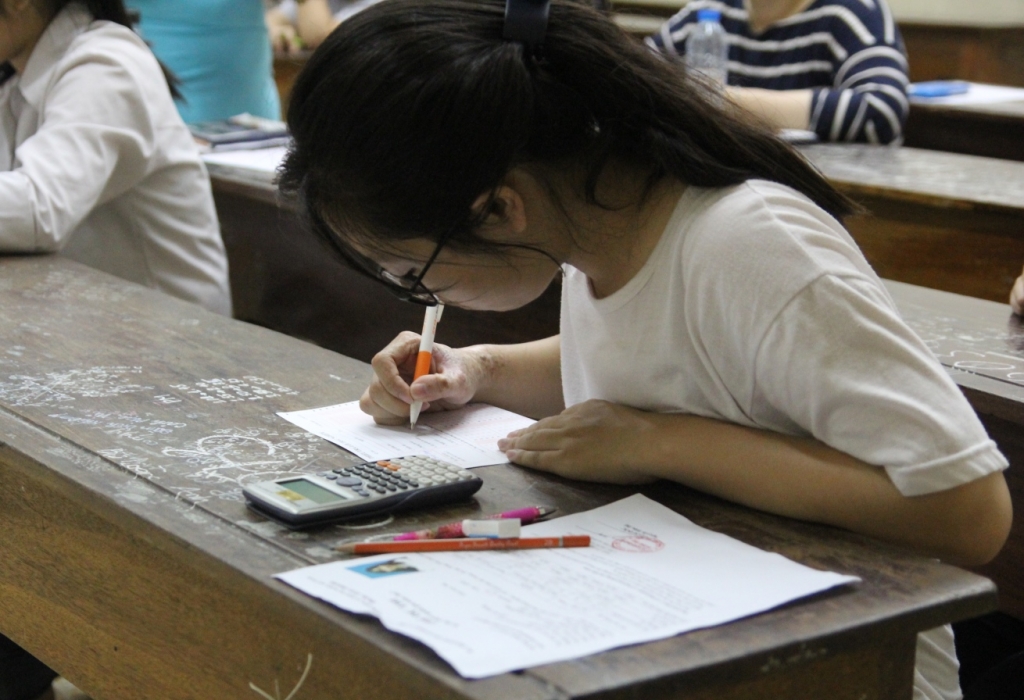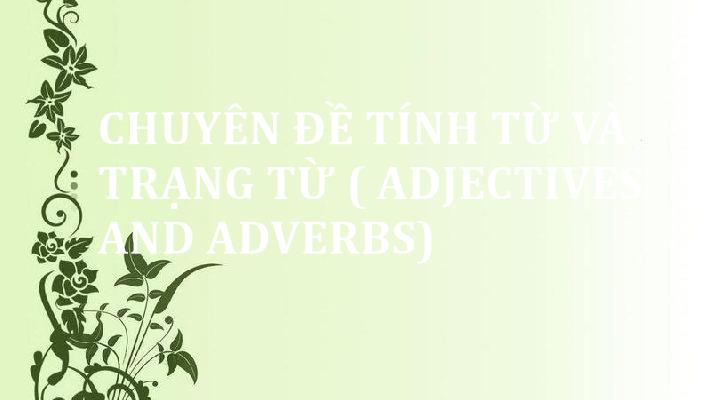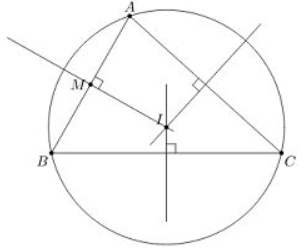III- Thì quá khứ đơn (Simple Past):
1) Cách thành lập:
|
- Câu khẳng định |
S + V2/ed + O |
S + was/were + O |
|
- Câu phủ định |
S + did + not + V- inf + O |
S + was/were + not + O |
|
- Câu hỏi |
Did + S + V- inf + O? |
Was/Were + S + O? |
2) Cách dùng chính:
Thì quá khứ đơn dùng để diễn tả hành động xảy ra và hoàn tất trong quá khứ với thời gian xác định rõ. Các trạng từ thường được dùng: yesterday, ago, last week/month/year, in the past, in 1990
- Hành động xen vào của thì QKTD: When + S + V( QKĐ), S + V ( QKTD).
- Hành động sảy ra sau của một hành đông khác ở thì QKHT: S + V( QKĐ), S + V ( QKHT).
Ex: - He was a doctor in this hospital from 1997 to 2005.
- They finished the work two hours ago.
- He bought this villa last month.
3) Cách thêm đuôi “ ed” trong các động từ có qui tắc.
- Động từ tận cùng đã là “e + d”: hope – hoped, arrive – arrived,…
- Động từ tận cùng là “ y” thì “đổi y thành i + ed”: carry – carried,………….
- Động từ một âm tiết tận cùng là một phụ âm và trước nó là một nguyên âm ta phải gấp đôi phụ âm trước khi thêm ed: stop – stopped, beg – begged,…
4) Cách phát âm đuôi “ ed”:
- /id/: Khi tận cùng của động từ có chứa “ t, d”: want – wanted, decide – decided,…
- /t/ : Khi động từ có tận cùng là: “ k, p, s, gh, ch, sh, f, ce ”: look – looked, stop – stopped,…
- /d/ : Tận cùng là các nguyên âm và phụ âm còn lại trừ hai trường hợp trên: arrive – arrived,…
VD: Lựa chọn và điền dạng đúng của từ:
teach cook want spend ring
be sleep study go write
1. She…..out with her boyfriend last night.
2. Laura…..a meal yesterday afternoon.
3. Mozart…..more than 600 pieces of music.
4. I…..tired when I came home.
5. The bed was very comfortable so they…..very well.
6. Jamie passed the exam because he…..very hard.
7. My father…..the teenagers to drive when he was alive.
8. Dave…..to make a fire but there was no wood.
9. The little boy…..hours in his room making his toys.
10. The telephone…..several times and then stopped before I could answer it.
Đ/a: 1. went
2. cooked
3. wrote
4. was tired
5. slept
6. studied
7. taught
8. wanted
9. spent
10. rang
Exercise1: Hoàn thành câu sau đúng dạng của thì quá khứ đơn :
1. It/ be/ cloudy/ yesterday.
2. In 1990/ we/ move/ to another city.
3. When/ you/ get/ the first gift?
4. She/ not/ go/ to the church/ five days ago.
5. How/ be/ he/ yesterday?
6. and Mrs. James/ come back home/ and/ have/ lunch/ late/ last night?
7. They/ happy/ last holiday?
8. How/ you/ get there?
9. I/ play/ football/ last/ Sunday.
10. My/ mother/ make/ two/ cake/ four/ day/ ago.
11. Tyler/ visit/ his/ grandmother/ last/ month.
12. Joni/ go/ zoo/ five/ day/ ago.
13. We/ have/ fun/ yesterday.
14. My/ father/ not/ at the office/ the day/ before yesterday.
Đ/a:
1. It was cloudy yesterday.
2. In 1990, we moved to another city./ We moved to another city in 1990.
3. When did you get the first gift?
4. She did not go to the church five days ago./ She didn’t go to the church five days ago.
5. How was he yesterday?
6. Did Mr. and Mrs. James come back home and have lunch late last night?
7. Were they happy last holiday?
8. How did you get there?
9. I played football last Sunday.
10. My mother made two cakes four days ago.
11. Tyler visited his grandmother last month.
12. Joni went to the zoo five days ago.
13. We had fun yesterday.
14. My father was not at the office the day before yesterday./ My father wasn’t at the office the day before yesterday.
Exercise 2: Cho dạng đúng của động từ trong ngoặc
1. They ( build)……………….that pagoda more than 200 years ago.
2. You ( not/ do)……………………your homework last night.
3. Laura ( give )…………………….me that letter a few minutes ago.
4. My son ( play ) ……………………chess with his sister at 8.30 a.m yesterday.
5. While Jane ( do ) ……………………homework at home, her friends ( play)…………… games on the computer at this time last night.
6. Do you like this picture? My daughter( paint)……………………it three days ago.
7. Last night, We ( have )…………………….dinner when the fire ( start)…………………
8. He ( tell) ……………..us about his marriage when we ( sit ) ……………………top chat last night.
9. When they ( get )………………..to the station, all the passengers ( get)………………… into the train.
10. when it ( rain )…………………., they ( walk)………………….through the forest.
Đ/a:
1.built
2.didn’t do
3.gave
4.played
5.did/played
6.painted
7.had/started
8.told/sat
9.got/got
10.rained/walked
Exercise 3: Chia động từ trong ngoặc đúng dạng thì quá khứ đơn:
Snow White was the daughter of a beautiful queen, who died when the girl (be) (1)……….. young. Her father (get married) (2) ………….again, but the girl’s stepmother was very jealous of her because she was so beautiful. The evil queen (order) (3)………….a hunter to kill Snow White but he couldn’t do it because she was so lovely. He (chase) (4) ………….her away instead, and she (take) (5) ………….refuge with seven dwarfs in their house in the forest. She (live) (6) ………….with the dwarfs and took care of them and they (love) (7) ………….her dearly. Then, one day the talking mirror (tell) (8) ………….the evil queen that Snow White was still alive. She (change) (9) ………….herself into a witch and (make) (10) ………….a poisoned apple. She (go) (11) ………….to the dwarfs’ house disguised as an old woman and tempted Snow White to eat the poisoned apple, which (put) (12)………….her into an everlasting sleep. Finally, a prince (find) (13) ………….her in the glass coffin where the dwarfs had put her and woke her up with a kiss. Snow White and the prince (be) (14) ………….married and lived happily ever after.
Đ/a: 1. was
2. got married
3. ordered
4. chased
5. took
6. lived
7. loved
8. told
9. changed
10. made
11. went
12. put
13. found
14. were
IV- Thì Quá khứ tiếp diễn (Past Continuous):
1) Cách thành lập:
- Câu khẳng định S + was/were + V-ing + O
- Câu phủ định S + was/were + not + V-ing + O
- Câu hỏi Was/Were + S + V-ing + O?
2) Cách dùng chính: Thì QKTD dùng để diễn tả:
2.1 Một hành động sảy ra ( và kéo dài) vào một thời điểm hoặc một thời gian trong quá khứ.
Ex: - She was studying her lesson at 7 last night.
- What were you doing from 3pm to 6pm yesterday?
- I was practising English at that time yesterday.
2.2 Một hành động đang xảy ra (V-ing) ở quá khứ thì có một hành động khác xen vào( V2/ed).
Ex: - He was sleeping when I came.
- While my mother was cooking dinner, the phone rang.
2.3 Hai hành động diễn ra song song trong cùng một lúc trong quá khứ
Ex: While I was doing my homework, my younger brother was playing video games.
VD:
1. Alice saw/ was seeing the accident when she was catching the bus.
2. What were you doing/ did you do when I called?
3. I didn’t visit/ weren’t visiting my friends last summer holiday.
4. It rained/ was raining heavily last July.
5. While people were talking to each other, he read/ was reading his book.
6. My sister was eating/ ate hamburgers every weekend last month.
7. While we were running/ ran in the park, Mary fell over.
8. Did you find/ Were you finding your keys yesterday?
9. Who was she dancing/ did she dance with at the party last night?
10. They were watching/ watched football on TV at 7 p.m. yesterday.
Đ/a:V 1. saw
2. were you doing
3. didn’t visit
4. rained
5. was reading
6. ate
7. were running
8. did you find
9. did she dance
10. were watching
Exercise 1: Hoàn thành các câu sau sử dụng thì quá khứ đơn và quá khứ tiếp diễn:
1. Where/ you/ go?
2. Who/ you/ go with?
3. How/ you/ get/ there?
4. What/ you/ do/ during the day?
5. you/ have/ a/ good/ time?
6. What/ your parents/ do/ while/ you/ go/ on holiday?
Đ/a:
1. Where did you go?
2. Who did you go with?
3. How did you get there?
4. What were you doing during the day?
5. Did you have a good time?
6. What were your parents doing while you were going on holiday?
Exercise 2: Chia đúng các động từ sau ở thì quá khứ đơn và quá khứ tiếp diễn:
In my last holiday, I went to Hawaii. When I (go) (1) …………to the beach for the first time, something wonderful happened. I (swim) (2) …………in the sea while my mother was sleeping in the sun. My brother was building a sand castle and my father (drink) (3) …………. some water. Suddenly, I (see) (4) …………a boy on the beach. His eyes were blue like the water in the sea and his hair (be) (5) …………beautiful black. He was very tall and thin and his face was brown. My heart (beat) (6) …………fast. I (ask) (7) …………him for his name with a shy voice. He (tell) (8) …………me that his name was John. He (stay) (9) …………with me the whole afternoon. In the evening, we met again. We ate pizza in a restaurant. The following days we (have) (10) …………a lot of fun together. At the end of my holiday when I left Hawaii I said goodbye to John. We had tears in our eyes. He wrote me a letter very soon and I answered him.
Đ/a: In my last holiday, I went to Hawaii. When I went to the beach for the first time, something wonderful happened. I was swimming in the sea while my mother was sleeping in the sun. My brother was building a sand castle and my father was drinking some water. Suddenly, I saw a boy on the beach. His eyes were blue like the water in the sea and his hair was beautiful black. He was very tall and thin and his face was brown. My heart was beating fast. I asked him for his name with a shy voice. He told me that his name was John. He stayed with me the whole afternoon. In the evening, we met again. We ate pizza in a restaurant. The following days wehad a lot of fun together. At the end of my holiday when I left Hawaii I said goodbye to John. We had tears in our eyes. He wrote me a letter very soon and I answered him.
V- THÌ HIỆN TẠI HOÀN THÀNH (Present Perfect):
1) Cách thành lập:
- Câu khẳng định S + have/has+ V3/ed + O
- Câu phủ định S + have/has + not + V3/ed + O
- Câu hỏi Have/Has + S + V3/ed + O ?
2) Cách dùng chính:Thì HTHT dùng để diễn tảû:
2.1 Một hành động sảy ra trong quá khứ nhưng không xác định rõ thời điểm.
Ex: Have you had breakfast? – No, I haven’t.
2.2 Một hành động sảy ra trong quá khứ và kéo dài đến hiện tại, một hành động bắt đầu trong quá khứ và dừng lại tại lúc nói.
Ex: My friend Nam has lived in HCMC since 1998.
2.3 Một hành động vừa mới sảy ra.
Ex: I have just finished my homework.
2.4 Trong cấu trúc:
Be + the first/second… time + S + have/has + V3/ed
Be + the SS nhất + N + S + have/has + V3/ed
Ex: This is the first time I have been to Paris.
She is the most honest person I have ever met.
3) Các trạng từ thường dùng với thì HTHT:
Just , recently/lately, ever, never, yet, already, several times, since + mốc thời gian/ clause( QKĐ), for + khoảng thời gian, for a long time/for ages, so far, until now/up to now/up to the present; during the last few days/weeks/months/years; all this week/month/year, ….
VD:
1. I _______________ (dream) of winning a medal for a long time.
2. She _______________ (not/ see) much of Vietnam, so she wants to see more this year.
3. _______________ you ever _______________ (be) to a desert? No, never.
4. Van _______________ (throw) a surprise party for her boyfriend.
5. Where _______________ Stephen _______________ (be) for the past 2 days?
Đ/a: 1. have dreamt 2. hasn’t seen 3. Have…been 4. has thrown 5. Has…been
Exercise 1: Gạch chân dưới đáp án đúng.
0. His family hasn’t contacted/ didn’t contact him for 5 years.
1. She has seen/ saw that movie more than 5 times.
2. Stop complaining! You haven’t stopped/ stopped since you arrived.
3. We haven’t found/ didn’t find any sign of life since we landed on Mars.
4. Ms. Rose has never taken/ has taken never me to see her flat.
5. Congratulations! You have passed/ passed the exam.
Đ/a: 1. has seen 2. haven’t stopped 3. haven’t found 4. has never taken 5. Passed
Exercise 2: Cho dạng đúng của động từ trong ngoặc.
1. I ( not/see)………………………..her since 2002, but I often ( write )……………… to her every weekend.
2. She ( finish) ………………………her report since Monday.
3. It ( not/rain)……………………….here for a long times.
4. They ( not/ go)………………………..to the movies together for ages.
5. Sorry! I (not/ write)……………………..to you for a long times.
6. My mother ( watch )……………………….that film three times,
7. How long have you ( learn )…………………English?
8. This is the worst restaurant they ( eat/ever)………………………
9. That is the first time he ( meet)…………………a beautiful girl such her.
10. He ( work)…………………in this company since he ( leave)……………….high school.
Đ/a:
1.haven’t seen/write
2.has finished
3.hasn’t rained
4.haven’t gone
5.haven’t written
6.has watched
7.learnt
8.have ever eaten
9.has met
10.has worked/ left
VI- THÌ QUÁ KHỨ HOÀN THÀNH(Past Perfect):
1) Cách thành lập:
- Câu khẳng định S + had + V3/ed + O
- Câu phủ định S + had+ not + V3/ed + O
- Câu hỏi Had + S + V3/ed + O?
2) Cách dùng chính:
Thì QKHT dùng để diễn tảû:
2.1Một hành động xảy ra và hoàn tất trước một thời điểm hoặc một hành đông khác trong quá khứ ( hành đông sảy ra trước dung HAD + V3/ED, hành đông sau dùng QKĐ V2/ed).
Ex: We had had dinner before eight o’clock last night.
Lucie had learned English before she came to England.
2.2 Một hành động đã sảy ra nhưng chưa hoàn thành tính đến một thời điểm nào đó trong quá khứ.
Ex: By the time I left that school, I had taught there for ten years.
3) Thì này thường được dùng với các từ, ngữ sau đây.
* After, before, when, as, once
Ex: When I got to the station, the train had already left.
- No sooner … than ( vừa mới … thì)
- Hardly/Scarely … when ( vừa mới … thì)
Ex: He had no sooner returned from abroad than he fell ill.
---> No sooner had he returned from abroad than he fell ill.
Exercise 1: Hoàn thành câu
- When Hoa arrived at the theater, the film ____________(start).
- He ____________ (live) in Laos before He went to Vietnam.
- After Lan ____________ (eat) the cake, Lan began to feel sick.
- If he ____________ (listen) to me, he would have got the job.
- Linh didn’t arrive until I ____________ (leave).
- After they ____________ (finish) lunch, they went out.
- The tree was dead because it ____________ (be) arid all summer.
- I ____________ (meet) him somewhere before.
- They were late for the flight because they ____________ (forget) their passports.
- Linh told me she ____________ (study) a lot before the exam.
- The leaf was yellow because it ____________ (not/rain) all summer.
- The lamp went off because I ____________ (not/pay) the electricity bill.
- Hoa____________ (not/do) her homework, so she was in trouble.
- She ____________ (not/eat) so we went to a restaurant.
- I couldn’t go into the cinema because I ____________ (not/bring) my tickets.
- He said that He ____________ (not/visit) the US before.
- Hoa and Lan ____________ (not/meet) before the exam.
- I ____________ (not/have) lunch when she arrived.
- She ____________ (not/use) smartphone before, so I showed her how to use it.
- Linh ____________ (not/study) for the exam, so she was very anxious.
Đ/a: 1.had started 2.had lived 3.had eaten 4.had listened 5.had left 6.had finished 7.had been 8.had met 9.had forgotten 10.had studied 11.hadn’t rained 12.hadn’t paid 13.hadn’t done 14.hadn’t eaten
15.hadn’t brought 16.hadn’t visited 17.hadn’t met 18.hadn’t had 19.hadn’t used 20.hadn’t studied
Exercise 2:
1.I was exhausted at the end of the test. I (write) ____________ for over three hours.
2.When thieves stole my favourite leather wallet, I was really upset. I (have) ____________ it for over five years.
3.Please step out of the truck, Mr.Đạt. Do you realise you (drive) ____________ at over 100mph?
4.We didn’t really want to go and see the film again. We (already see) ____________ it twice – so we said “no” and we went to a shopping mall instead!
5.I arrived over two hours late to the office and everyone in my company was working. Actually, they (work) ____________ for over three hours on the new project and I felt really guilty.
6.The kitchen was full of pans when we arrived. Loan was in the kitchen and she (cook) ____________ a big meal for everyone at the party.
7.It was a bit discomfiture to arrive at their house and find Linh looking so depressed. I think she (cry) ____________ before I got there.
8.No-one even noticed when he got home. They (all watch) ____________ the favorite show on television.
Đ/a:
1. had been writing.
2.had had.
3.were driving.
4.had already seen.
5.had been working.
6.was cooking.
7.had been crying.
8.were all watching.
III- Thì quá khứ đơn (Simple Past):
1) Cách thành lập:
|
- Câu khẳng định |
S + V2/ed + O |
S + was/were + O |
|
- Câu phủ định |
S + did + not + V- inf + O |
S + was/were + not + O |
|
- Câu hỏi |
Did + S + V- inf + O? |
Was/Were + S + O? |
2) Cách dùng chính:
Thì quá khứ đơn dùng để diễn tả hành động xảy ra và hoàn tất trong quá khứ với thời gian xác định rõ. Các trạng từ thường được dùng: yesterday, ago, last week/month/year, in the past, in 1990
- Hành động xen vào của thì QKTD: When + S + V( QKĐ), S + V ( QKTD).
- Hành động sảy ra sau của một hành đông khác ở thì QKHT: S + V( QKĐ), S + V ( QKHT).
Ex: - He was a doctor in this hospital from 1997 to 2005.
- They finished the work two hours ago.
- He bought this villa last month.
3) Cách thêm đuôi “ ed” trong các động từ có qui tắc.
- Động từ tận cùng đã là “e + d”: hope – hoped, arrive – arrived,…
- Động từ tận cùng là “ y” thì “đổi y thành i + ed”: carry – carried,………….
- Động từ một âm tiết tận cùng là một phụ âm và trước nó là một nguyên âm ta phải gấp đôi phụ âm trước khi thêm ed: stop – stopped, beg – begged,…
4) Cách phát âm đuôi “ ed”:
- /id/: Khi tận cùng của động từ có chứa “ t, d”: want – wanted, decide – decided,…
- /t/ : Khi động từ có tận cùng là: “ k, p, s, gh, ch, sh, f, ce ”: look – looked, stop – stopped,…
- /d/ : Tận cùng là các nguyên âm và phụ âm còn lại trừ hai trường hợp trên: arrive – arrived,…
VD: Lựa chọn và điền dạng đúng của từ:
teach cook want spend ring
be sleep study go write
1. She…..out with her boyfriend last night.
2. Laura…..a meal yesterday afternoon.
3. Mozart…..more than 600 pieces of music.
4. I…..tired when I came home.
5. The bed was very comfortable so they…..very well.
6. Jamie passed the exam because he…..very hard.
7. My father…..the teenagers to drive when he was alive.
8. Dave…..to make a fire but there was no wood.
9. The little boy…..hours in his room making his toys.
10. The telephone…..several times and then stopped before I could answer it.
Đ/a: 1. went
2. cooked
3. wrote
4. was tired
5. slept
6. studied
7. taught
8. wanted
9. spent
10. rang
Exercise1: Hoàn thành câu sau đúng dạng của thì quá khứ đơn :
1. It/ be/ cloudy/ yesterday.
2. In 1990/ we/ move/ to another city.
3. When/ you/ get/ the first gift?
4. She/ not/ go/ to the church/ five days ago.
5. How/ be/ he/ yesterday?
6. and Mrs. James/ come back home/ and/ have/ lunch/ late/ last night?
7. They/ happy/ last holiday?
8. How/ you/ get there?
9. I/ play/ football/ last/ Sunday.
10. My/ mother/ make/ two/ cake/ four/ day/ ago.
11. Tyler/ visit/ his/ grandmother/ last/ month.
12. Joni/ go/ zoo/ five/ day/ ago.
13. We/ have/ fun/ yesterday.
14. My/ father/ not/ at the office/ the day/ before yesterday.
Đ/a:
1. It was cloudy yesterday.
2. In 1990, we moved to another city./ We moved to another city in 1990.
3. When did you get the first gift?
4. She did not go to the church five days ago./ She didn’t go to the church five days ago.
5. How was he yesterday?
6. Did Mr. and Mrs. James come back home and have lunch late last night?
7. Were they happy last holiday?
8. How did you get there?
9. I played football last Sunday.
10. My mother made two cakes four days ago.
11. Tyler visited his grandmother last month.
12. Joni went to the zoo five days ago.
13. We had fun yesterday.
14. My father was not at the office the day before yesterday./ My father wasn’t at the office the day before yesterday.
Exercise 2: Cho dạng đúng của động từ trong ngoặc
1. They ( build)……………….that pagoda more than 200 years ago.
2. You ( not/ do)……………………your homework last night.
3. Laura ( give )…………………….me that letter a few minutes ago.
4. My son ( play ) ……………………chess with his sister at 8.30 a.m yesterday.
5. While Jane ( do ) ……………………homework at home, her friends ( play)…………… games on the computer at this time last night.
6. Do you like this picture? My daughter( paint)……………………it three days ago.
7. Last night, We ( have )…………………….dinner when the fire ( start)…………………
8. He ( tell) ……………..us about his marriage when we ( sit ) ……………………top chat last night.
9. When they ( get )………………..to the station, all the passengers ( get)………………… into the train.
10. when it ( rain )…………………., they ( walk)………………….through the forest.
Đ/a:
1.built
2.didn’t do
3.gave
4.played
5.did/played
6.painted
7.had/started
8.told/sat
9.got/got
10.rained/walked
Exercise 3: Chia động từ trong ngoặc đúng dạng thì quá khứ đơn:
Snow White was the daughter of a beautiful queen, who died when the girl (be) (1)……….. young. Her father (get married) (2) ………….again, but the girl’s stepmother was very jealous of her because she was so beautiful. The evil queen (order) (3)………….a hunter to kill Snow White but he couldn’t do it because she was so lovely. He (chase) (4) ………….her away instead, and she (take) (5) ………….refuge with seven dwarfs in their house in the forest. She (live) (6) ………….with the dwarfs and took care of them and they (love) (7) ………….her dearly. Then, one day the talking mirror (tell) (8) ………….the evil queen that Snow White was still alive. She (change) (9) ………….herself into a witch and (make) (10) ………….a poisoned apple. She (go) (11) ………….to the dwarfs’ house disguised as an old woman and tempted Snow White to eat the poisoned apple, which (put) (12)………….her into an everlasting sleep. Finally, a prince (find) (13) ………….her in the glass coffin where the dwarfs had put her and woke her up with a kiss. Snow White and the prince (be) (14) ………….married and lived happily ever after.
Đ/a: 1. was
2. got married
3. ordered
4. chased
5. took
6. lived
7. loved
8. told
9. changed
10. made
11. went
12. put
13. found
14. were
IV- Thì Quá khứ tiếp diễn (Past Continuous):
1) Cách thành lập:
- Câu khẳng định S + was/were + V-ing + O
- Câu phủ định S + was/were + not + V-ing + O
- Câu hỏi Was/Were + S + V-ing + O?
2) Cách dùng chính: Thì QKTD dùng để diễn tả:
2.1 Một hành động sảy ra ( và kéo dài) vào một thời điểm hoặc một thời gian trong quá khứ.
Ex: - She was studying her lesson at 7 last night.
- What were you doing from 3pm to 6pm yesterday?
- I was practising English at that time yesterday.
2.2 Một hành động đang xảy ra (V-ing) ở quá khứ thì có một hành động khác xen vào( V2/ed).
Ex: - He was sleeping when I came.
- While my mother was cooking dinner, the phone rang.
2.3 Hai hành động diễn ra song song trong cùng một lúc trong quá khứ
Ex: While I was doing my homework, my younger brother was playing video games.
VD:
1. Alice saw/ was seeing the accident when she was catching the bus.
2. What were you doing/ did you do when I called?
3. I didn’t visit/ weren’t visiting my friends last summer holiday.
4. It rained/ was raining heavily last July.
5. While people were talking to each other, he read/ was reading his book.
6. My sister was eating/ ate hamburgers every weekend last month.
7. While we were running/ ran in the park, Mary fell over.
8. Did you find/ Were you finding your keys yesterday?
9. Who was she dancing/ did she dance with at the party last night?
10. They were watching/ watched football on TV at 7 p.m. yesterday.
Đ/a:V 1. saw
2. were you doing
3. didn’t visit
4. rained
5. was reading
6. ate
7. were running
8. did you find
9. did she dance
10. were watching
Exercise 1: Hoàn thành các câu sau sử dụng thì quá khứ đơn và quá khứ tiếp diễn:
1. Where/ you/ go?
2. Who/ you/ go with?
3. How/ you/ get/ there?
4. What/ you/ do/ during the day?
5. you/ have/ a/ good/ time?
6. What/ your parents/ do/ while/ you/ go/ on holiday?
Đ/a:
1. Where did you go?
2. Who did you go with?
3. How did you get there?
4. What were you doing during the day?
5. Did you have a good time?
6. What were your parents doing while you were going on holiday?
Exercise 2: Chia đúng các động từ sau ở thì quá khứ đơn và quá khứ tiếp diễn:
In my last holiday, I went to Hawaii. When I (go) (1) …………to the beach for the first time, something wonderful happened. I (swim) (2) …………in the sea while my mother was sleeping in the sun. My brother was building a sand castle and my father (drink) (3) …………. some water. Suddenly, I (see) (4) …………a boy on the beach. His eyes were blue like the water in the sea and his hair (be) (5) …………beautiful black. He was very tall and thin and his face was brown. My heart (beat) (6) …………fast. I (ask) (7) …………him for his name with a shy voice. He (tell) (8) …………me that his name was John. He (stay) (9) …………with me the whole afternoon. In the evening, we met again. We ate pizza in a restaurant. The following days we (have) (10) …………a lot of fun together. At the end of my holiday when I left Hawaii I said goodbye to John. We had tears in our eyes. He wrote me a letter very soon and I answered him.
Đ/a: In my last holiday, I went to Hawaii. When I went to the beach for the first time, something wonderful happened. I was swimming in the sea while my mother was sleeping in the sun. My brother was building a sand castle and my father was drinking some water. Suddenly, I saw a boy on the beach. His eyes were blue like the water in the sea and his hair was beautiful black. He was very tall and thin and his face was brown. My heart was beating fast. I asked him for his name with a shy voice. He told me that his name was John. He stayed with me the whole afternoon. In the evening, we met again. We ate pizza in a restaurant. The following days wehad a lot of fun together. At the end of my holiday when I left Hawaii I said goodbye to John. We had tears in our eyes. He wrote me a letter very soon and I answered him.
V- THÌ HIỆN TẠI HOÀN THÀNH (Present Perfect):
1) Cách thành lập:
- Câu khẳng định S + have/has+ V3/ed + O
- Câu phủ định S + have/has + not + V3/ed + O
- Câu hỏi Have/Has + S + V3/ed + O ?
2) Cách dùng chính:Thì HTHT dùng để diễn tảû:
2.1 Một hành động sảy ra trong quá khứ nhưng không xác định rõ thời điểm.
Ex: Have you had breakfast? – No, I haven’t.
2.2 Một hành động sảy ra trong quá khứ và kéo dài đến hiện tại, một hành động bắt đầu trong quá khứ và dừng lại tại lúc nói.
Ex: My friend Nam has lived in HCMC since 1998.
2.3 Một hành động vừa mới sảy ra.
Ex: I have just finished my homework.
2.4 Trong cấu trúc:
Be + the first/second… time + S + have/has + V3/ed
Be + the SS nhất + N + S + have/has + V3/ed
Ex: This is the first time I have been to Paris.
She is the most honest person I have ever met.
3) Các trạng từ thường dùng với thì HTHT:
Just , recently/lately, ever, never, yet, already, several times, since + mốc thời gian/ clause( QKĐ), for + khoảng thời gian, for a long time/for ages, so far, until now/up to now/up to the present; during the last few days/weeks/months/years; all this week/month/year, ….
VD:
1. I _______________ (dream) of winning a medal for a long time.
2. She _______________ (not/ see) much of Vietnam, so she wants to see more this year.
3. _______________ you ever _______________ (be) to a desert? No, never.
4. Van _______________ (throw) a surprise party for her boyfriend.
5. Where _______________ Stephen _______________ (be) for the past 2 days?
Đ/a: 1. have dreamt 2. hasn’t seen 3. Have…been 4. has thrown 5. Has…been
Exercise 1: Gạch chân dưới đáp án đúng.
0. His family hasn’t contacted/ didn’t contact him for 5 years.
1. She has seen/ saw that movie more than 5 times.
2. Stop complaining! You haven’t stopped/ stopped since you arrived.
3. We haven’t found/ didn’t find any sign of life since we landed on Mars.
4. Ms. Rose has never taken/ has taken never me to see her flat.
5. Congratulations! You have passed/ passed the exam.
Đ/a: 1. has seen 2. haven’t stopped 3. haven’t found 4. has never taken 5. Passed
Exercise 2: Cho dạng đúng của động từ trong ngoặc.
1. I ( not/see)………………………..her since 2002, but I often ( write )……………… to her every weekend.
2. She ( finish) ………………………her report since Monday.
3. It ( not/rain)……………………….here for a long times.
4. They ( not/ go)………………………..to the movies together for ages.
5. Sorry! I (not/ write)……………………..to you for a long times.
6. My mother ( watch )……………………….that film three times,
7. How long have you ( learn )…………………English?
8. This is the worst restaurant they ( eat/ever)………………………
9. That is the first time he ( meet)…………………a beautiful girl such her.
10. He ( work)…………………in this company since he ( leave)……………….high school.
Đ/a:
1.haven’t seen/write
2.has finished
3.hasn’t rained
4.haven’t gone
5.haven’t written
6.has watched
7.learnt
8.have ever eaten
9.has met
10.has worked/ left
VI- THÌ QUÁ KHỨ HOÀN THÀNH(Past Perfect):
1) Cách thành lập:
- Câu khẳng định S + had + V3/ed + O
- Câu phủ định S + had+ not + V3/ed + O
- Câu hỏi Had + S + V3/ed + O?
2) Cách dùng chính:
Thì QKHT dùng để diễn tảû:
2.1Một hành động xảy ra và hoàn tất trước một thời điểm hoặc một hành đông khác trong quá khứ ( hành đông sảy ra trước dung HAD + V3/ED, hành đông sau dùng QKĐ V2/ed).
Ex: We had had dinner before eight o’clock last night.
Lucie had learned English before she came to England.
2.2 Một hành động đã sảy ra nhưng chưa hoàn thành tính đến một thời điểm nào đó trong quá khứ.
Ex: By the time I left that school, I had taught there for ten years.
3) Thì này thường được dùng với các từ, ngữ sau đây.
* After, before, when, as, once
Ex: When I got to the station, the train had already left.
- No sooner … than ( vừa mới … thì)
- Hardly/Scarely … when ( vừa mới … thì)
Ex: He had no sooner returned from abroad than he fell ill.
---> No sooner had he returned from abroad than he fell ill.
Exercise 1: Hoàn thành câu
- When Hoa arrived at the theater, the film ____________(start).
- He ____________ (live) in Laos before He went to Vietnam.
- After Lan ____________ (eat) the cake, Lan began to feel sick.
- If he ____________ (listen) to me, he would have got the job.
- Linh didn’t arrive until I ____________ (leave).
- After they ____________ (finish) lunch, they went out.
- The tree was dead because it ____________ (be) arid all summer.
- I ____________ (meet) him somewhere before.
- They were late for the flight because they ____________ (forget) their passports.
- Linh told me she ____________ (study) a lot before the exam.
- The leaf was yellow because it ____________ (not/rain) all summer.
- The lamp went off because I ____________ (not/pay) the electricity bill.
- Hoa____________ (not/do) her homework, so she was in trouble.
- She ____________ (not/eat) so we went to a restaurant.
- I couldn’t go into the cinema because I ____________ (not/bring) my tickets.
- He said that He ____________ (not/visit) the US before.
- Hoa and Lan ____________ (not/meet) before the exam.
- I ____________ (not/have) lunch when she arrived.
- She ____________ (not/use) smartphone before, so I showed her how to use it.
- Linh ____________ (not/study) for the exam, so she was very anxious.
Đ/a: 1.had started 2.had lived 3.had eaten 4.had listened 5.had left 6.had finished 7.had been 8.had met 9.had forgotten 10.had studied 11.hadn’t rained 12.hadn’t paid 13.hadn’t done 14.hadn’t eaten
15.hadn’t brought 16.hadn’t visited 17.hadn’t met 18.hadn’t had 19.hadn’t used 20.hadn’t studied
Exercise 2:
1.I was exhausted at the end of the test. I (write) ____________ for over three hours.
2.When thieves stole my favourite leather wallet, I was really upset. I (have) ____________ it for over five years.
3.Please step out of the truck, Mr.Đạt. Do you realise you (drive) ____________ at over 100mph?
4.We didn’t really want to go and see the film again. We (already see) ____________ it twice – so we said “no” and we went to a shopping mall instead!
5.I arrived over two hours late to the office and everyone in my company was working. Actually, they (work) ____________ for over three hours on the new project and I felt really guilty.
6.The kitchen was full of pans when we arrived. Loan was in the kitchen and she (cook) ____________ a big meal for everyone at the party.
7.It was a bit discomfiture to arrive at their house and find Linh looking so depressed. I think she (cry) ____________ before I got there.
8.No-one even noticed when he got home. They (all watch) ____________ the favorite show on television.
Đ/a:
1. had been writing.
2.had had.
3.were driving.
4.had already seen.
5.had been working.
6.was cooking.
7.had been crying.
8.were all watching.







